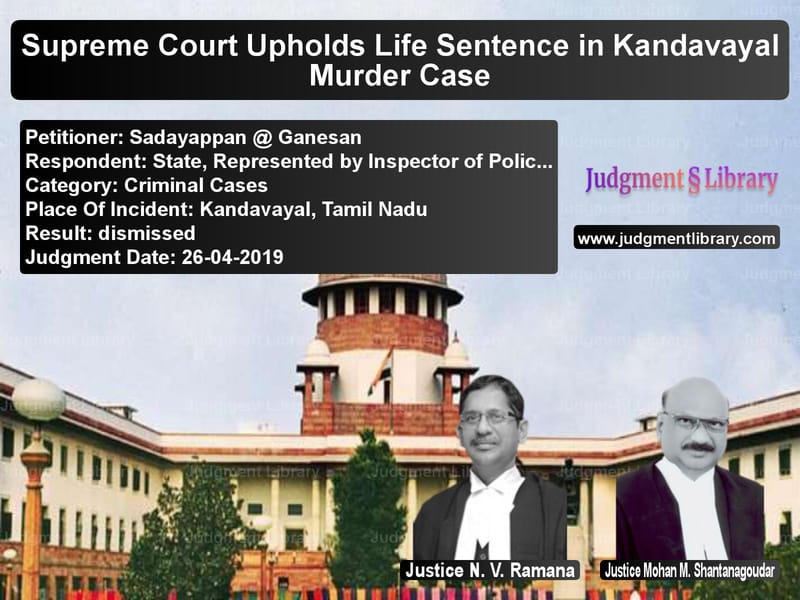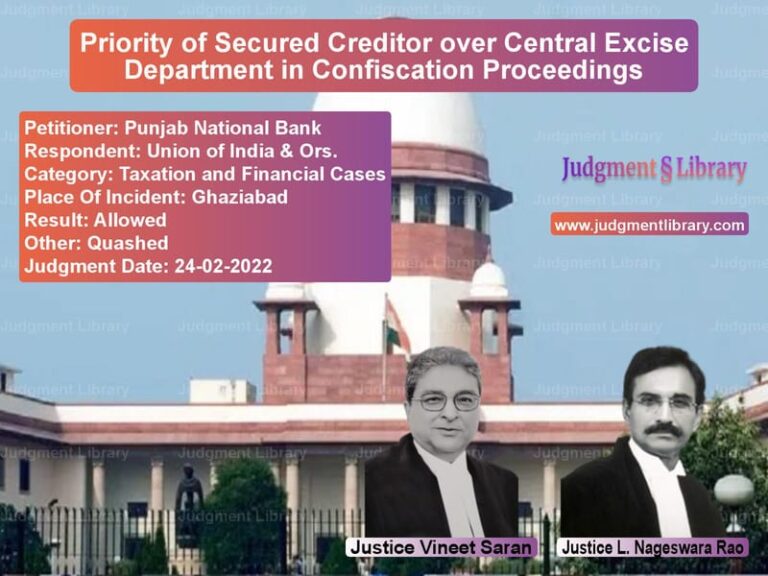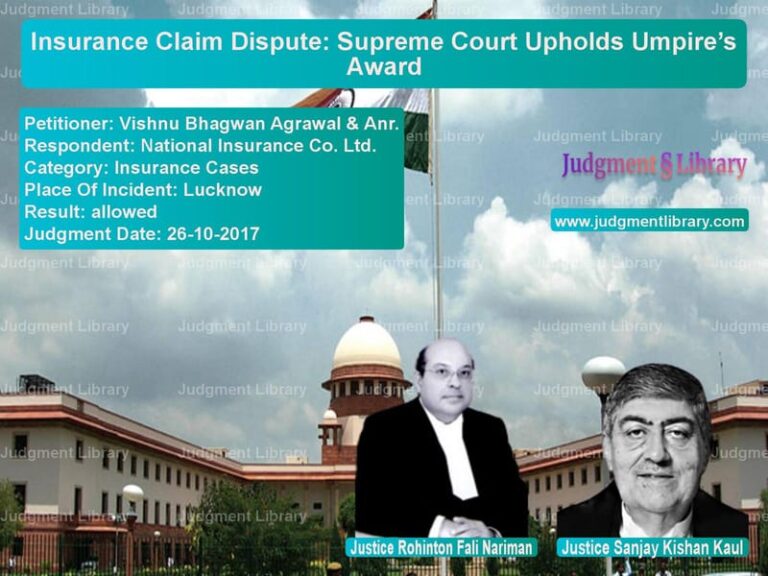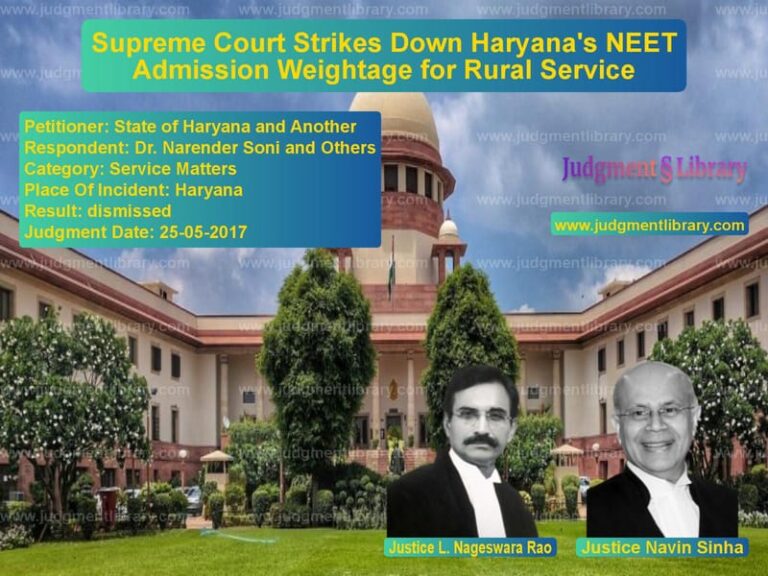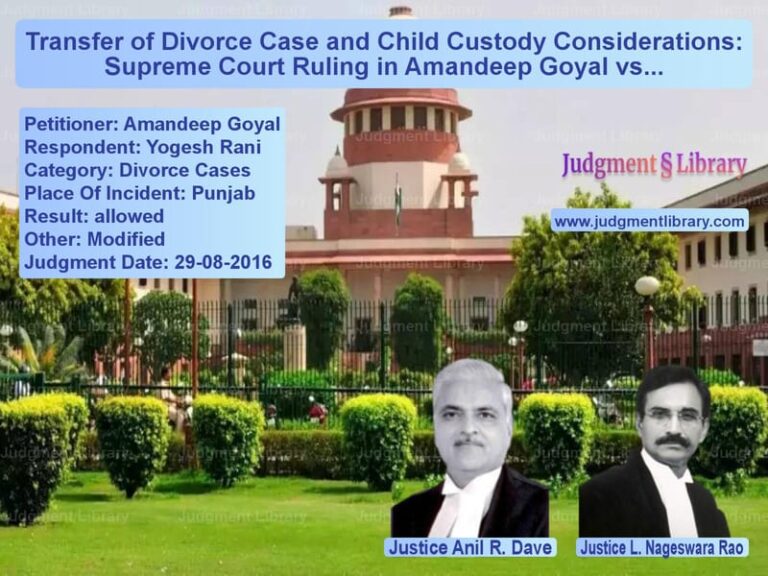Supreme Court Upholds Life Sentence in Kandavayal Murder Case
The Supreme Court of India, in a landmark judgment, upheld the conviction and life sentence of Sadayappan @ Ganesan (A2) in the gruesome murder of Selvam @ Thangaraj. The case, which has been under scrutiny for years, originated from a deep-seated land dispute and enmity between the deceased and the accused. This judgment reinforces the significance of circumstantial evidence and the validity of witness testimonies, even when they come from family members of the victim.
Background of the Case
The case traces its roots back to a land transaction that took place fifteen years prior to the murder. Selvam @ Thangaraj had entered into an agreement to purchase agricultural land from Karuppusamy (A1) and had paid ₹30,000 as consideration. However, A1, despite taking possession of the money, never executed the sale deed in favor of the deceased. Over time, this led to animosity between A1 and Thangaraj. A2, Sadayappan @ Ganesan, who was an adjacent landowner and a close associate of A1, actively supported A1 in preventing the registration of the land in Thangaraj’s name.
Despite this long-standing dispute, A1, A2, and Thangaraj continued to engage in hunting activities together, which had been a common practice among them. On the night of May 27, 2008, at approximately 11 p.m., A1 and A2 went to Thangaraj’s residence and insisted that he accompany them to the forest. The deceased, albeit hesitantly, complied with their request. The next morning, when he failed to return home, his wife, Rajammal (PW1), grew anxious and sent his brother, Palanisamy (PW2), and nephew, Govindarajan (PW3), to search for him. Their search ended in tragedy when they found Thangaraj’s lifeless body near the fields, bearing severe injuries.
Police Investigation and Arrest
Upon discovering the body, PW1 promptly filed a complaint with the Sirumugai Police Station. The case was registered under Section 302 of the Indian Penal Code (IPC) and Section 25(1B)(a) of the Indian Arms Act. The investigation was led by Assistant Commissioner of Police (PW15—Pandian), who initiated an inquest and recorded testimonies from witnesses. The body of the deceased was then sent for post-mortem examination.
During the course of the investigation, both A1 and A2 voluntarily surrendered before the Village Administrative Officer (VAO) on August 29, 2008. They made confessional statements admitting to their involvement in the murder. Based on their statements, the police recovered crucial evidence, including a Single Barrel Muzzle Loading Gun (MO1), a torchlight with a battery, blood-stained soil, torn clothing, and other material evidence. The forensic analysis confirmed the presence of gunpowder residue on the body and clothing of the deceased, directly linking MO1 to the crime.
Trial and Conviction
The trial was conducted before the Principal District and Sessions Judge, Coimbatore. The prosecution presented multiple witnesses, including PW1 (the deceased’s wife), PW2 (his brother), PW3 (his nephew), and forensic experts, all of whom reinforced the prosecution’s case. The trial court, relying on the circumstantial evidence and the testimonies of these witnesses, convicted both accused under Section 302 read with Section 34 of the IPC and sentenced them to life imprisonment along with a fine of ₹10,000.
A1 and A2 appealed their convictions before the High Court, which dismissed their appeals on December 13, 2011, affirming the trial court’s judgment. Subsequently, they approached the Supreme Court for relief. However, A1 passed away during the pendency of the appeal, leading to the abatement of his case. The Supreme Court, therefore, was left to adjudicate on A2’s appeal.
Arguments Before the Supreme Court
Appellant’s Arguments:
- The appellant’s counsel argued that the lower courts erroneously relied on testimonies of family members, branding them as ‘interested witnesses’ and questioning their credibility.
- The defense contended that the prosecution failed to establish a continuous chain of circumstantial evidence linking A2 to the crime beyond a reasonable doubt.
- It was asserted that the land dispute, which was cited as the motive for the murder, had been amicably resolved in a village panchayat, negating the claim of enmity.
- The admissibility of the extra-judicial confession was challenged on the grounds that the VAO, who recorded the statement, passed away before trial, preventing cross-examination.
Prosecution’s Counterarguments:
- The State’s counsel defended the reliance on the testimonies of PW1, PW2, PW3, and others, emphasizing that being related to the deceased does not automatically render them unreliable.
- The prosecution argued that the circumstantial evidence, forensic reports, and recovered weapon provided conclusive proof of the appellant’s guilt.
- It was highlighted that the Supreme Court had consistently held that extra-judicial confessions, if corroborated by other evidence, could be relied upon.
Supreme Court’s Ruling
The Supreme Court, after hearing both sides, meticulously analyzed the evidence and ruled in favor of upholding the conviction. The Court made the following observations:
- “A witness cannot be deemed unreliable solely because of familial ties. The jurisprudence distinguishes between a ‘related’ and an ‘interested’ witness. The latter applies only if the witness stands to gain from the conviction.” Citing Sudhakar v. State (2018) 5 SCC 435, the Court reaffirmed the credibility of the witnesses.
- The circumstantial evidence, taken together with forensic findings, formed an unbroken chain pointing to the guilt of the appellant.
- The forensic report conclusively linked the gun used in the murder to the appellant, refuting any claims of wrongful conviction.
- The extra-judicial confession, although recorded by a now-deceased VAO, was corroborated by other evidence and was therefore deemed admissible.
Final Judgment
In light of the overwhelming evidence, the Supreme Court dismissed the appeal and upheld the life sentence awarded to the appellant. This ruling serves as a reminder that circumstantial evidence, when strong and corroborative, holds substantial weight in criminal jurisprudence.
Petitioner Name: Sadayappan @ Ganesan.Respondent Name: State, Represented by Inspector of Police.Judgment By: Justice N. V. Ramana, Justice Mohan M. Shantanagoudar.Place Of Incident: Kandavayal, Tamil Nadu.Judgment Date: 26-04-2019.
Don’t miss out on the full details! Download the complete judgment in PDF format below and gain valuable insights instantly!
Download Judgment: Sadayappan @ Ganesan vs State, Represented b Supreme Court of India Judgment Dated 26-04-2019.pdf
Direct Downlaod Judgment: Direct downlaod this Judgment
See all petitions in Murder Cases
See all petitions in Bail and Anticipatory Bail
See all petitions in Attempt to Murder Cases
See all petitions in Custodial Deaths and Police Misconduct
See all petitions in Judgment by N.V. Ramana
See all petitions in Judgment by Mohan M. Shantanagoudar
See all petitions in dismissed
See all petitions in supreme court of India judgments April 2019
See all petitions in 2019 judgments
See all posts in Criminal Cases Category
See all allowed petitions in Criminal Cases Category
See all Dismissed petitions in Criminal Cases Category
See all partially allowed petitions in Criminal Cases Category

